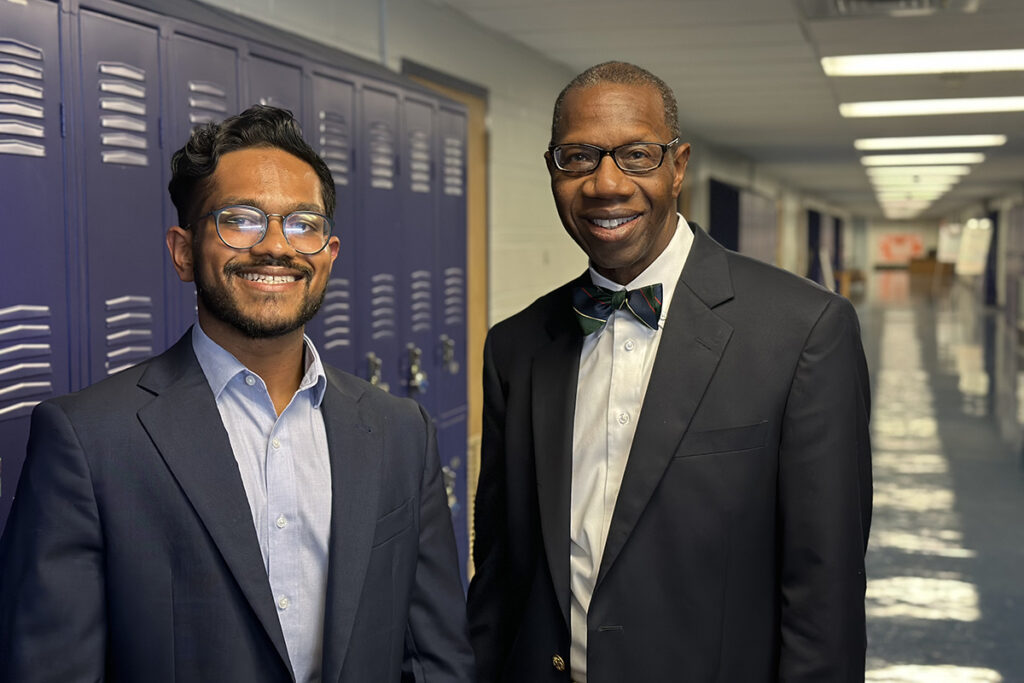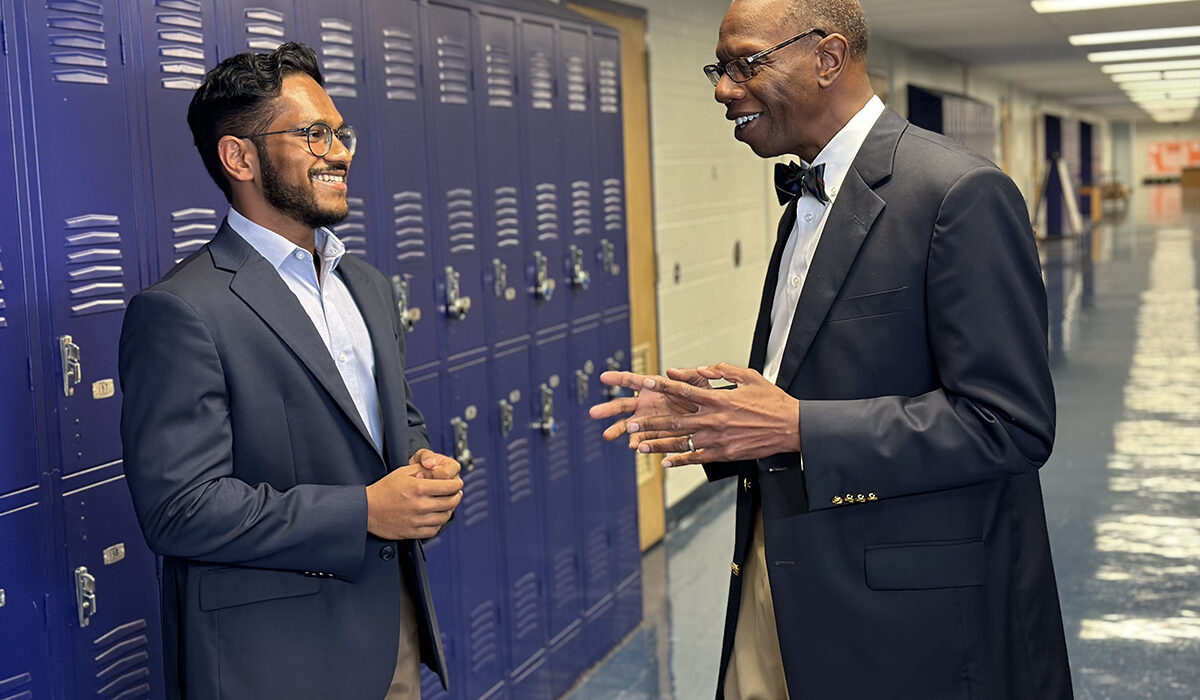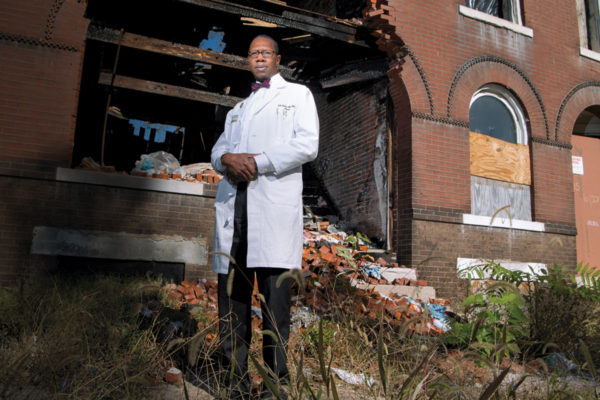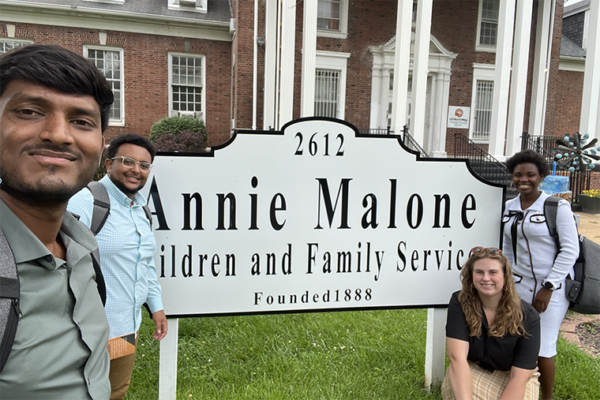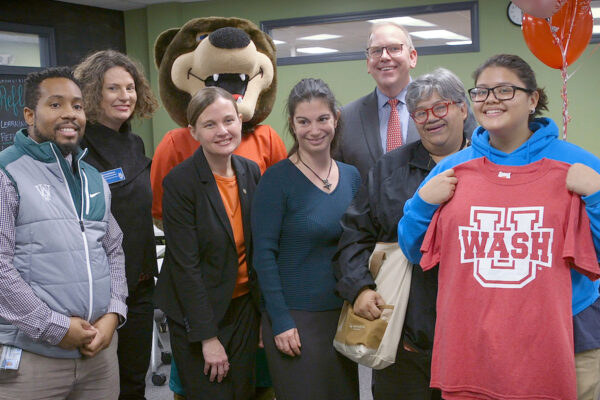In high school, Hamza Jalal held a human heart.
Only a junior, Jalal had the opportunity to study dissected cadavers in the anatomy lab at Washington University School of Medicine in St. Louis. With faculty and trainees providing guidance, he studied the spongy lobes of the lungs; the brain’s soft, maze-like folds; and brownish, bean-shaped kidneys.
But it was the heart that helped him envision his future as a doctor.
“I hoped to one day be a physician responsible for maintaining the health and longevity of a real beating heart,” said Hamza, a first-year medical student at the School of Medicine and a graduate of Collegiate School of Medicine and Bioscience in St. Louis. The latter, which sits a couple of miles from Washington University Medical Campus, is a high school co-founded by Will Ross, MD, the medical school’s associate dean for diversity, principal officer for Community Partnerships, and the Alumni Endowed Professor of Medicine.
“I wouldn’t have been afforded such a powerful and meaningful experience, of holding a human heart, if it weren’t for Dr. Ross and Collegiate School,” Jalal said. “I’m also grateful because Dr. Ross remains an inspiration and a mentor to this day.”
Ross co-founded Collegiate in 2013 as a magnet high school within Saint Louis Public Schools. The high school aims to serve high-achieving students, many of whom reside in under-resourced neighborhoods and are interested in pursuing careers in science, medicine and health. The inaugural class began with 44 students, including Jalal.
Besides the anatomy lab, Jalal’s formative high school experiences included attending lectures by Washington University faculty; shadowing prominent physicians in emergency medicine, anesthesiology, and pediatric cardiothoracic surgery; and presenting a team research project on kidney failure in the medical school’s Farrell Learning and Teaching Center.
Such hands-on experiences in the biosciences have helped Collegiate School’s enrollment increase to 334 students. Additionally, it excels in other college prep factors such as low teacher-student ratios and high standardized test scores, propelling many of its 406 alumni to study and earn undergraduate degrees at Washington University. Other graduates have gone on to other prestigious universities such as Yale, Dartmouth and the University of Pennsylvania.
Jalal graduated with honors from Washington University in 2021 with a bachelor’s degree in biology and a minor in psychology. He then spent a year studying Islamic psychology and volunteering at a health clinic in Istanbul, Turkey, and conducting research at Stanford University in Palo Alto, Calif., before becoming Collegiate School’s first alum enrolled at Washington University School of Medicine.
“Our goal was to create a preeminent medicine and science high school academy, an incubator for students who aspired to careers in medicine and biotechnology but were limited by few available opportunities,” Ross said. “Our students have seized upon the charge we gave them and have excelled beyond our expectations. Hamza Jalal is emblematic of all the forward-thinking, growth-minded graduates of Collegiate School of Medicine and Bioscience. We could not be prouder of them.”
In August, Collegiate School was ranked the No. 2 public high school out of 455 schools in Missouri, and No. 150 in the nation, according to U.S. News & World Report. Niche, another educational review site, elevated Collegiate School to the No. 1 position.
“Dr. Ross is a driving force behind Collegiate School’s success,” Principal Frederick Steele said. “His dedication to the school and students – past, present and future – is incredible. His 12-year commitment to providing students with rich access to medical experiences is an invaluable component of our students’ preparation for postsecondary success.”
Ross expounded on the importance of Collegiate School to students as well as to the St. Louis region.
Why did you co-found the school?
Collegiate School of Medicine and Bioscience has been a passion of mine ever since the other founders and I jotted ideas on a restaurant napkin, and it will continue to be my passion for years to come. The school formed with the premise that it is essential to recognize that to truly address the health needs of the region, we need a workforce that represents the region and is committed to staying in the region. Whether you look at data from the Bureau of Labor Statistics, the Missouri Council of Economic Development or other entities, they indicate that the growth of this region depends on creating a highly informed scientific workforce. And we see that with the expansion of jobs in health care, biotechnology and plant sciences. But what’s missing is the critical mass of students — in particular, students of color — who have the resources and skills to engage in these disciplines.
Given the region’s growing biosciences sector, it is imperative that we create a place where we can train and mobilize this young talent to become the next cadre of biomedical researchers, physicians, scientists and science educators. We want to show students that something exciting is happening, that St. Louis is undergoing a renaissance, and we want them to be a part of it. And so, we talk about those opportunities for them to stay and excel and create remarkable professional careers here. They will become partners in our community. They are the future.
Tell us more about the school.
It is diverse and quite innovative. We conducted a lot of research to develop the school, which included field trips to similar schools across the country, such as the DeBakey High School for Health Professions in Houston. Along with co-founders Kelvin Adams, former superintendent of Saint Louis Public Schools; former school district leaders Susan Katzman and Tim M. Murrell; Dennis Lower, former president and CEO of Cortex; and other prominent St. Louis educators and community leaders, we set high standards for entry. We married academic excellence and community service with character development among the desired attributes of our students. We recruited top teachers, and we established an intense, college-level curriculum that exposes students to anatomy, physiology, computer sciences and other disciplines, along with biomedical research. Principal Fred Steele has continuously inspired Collegiate School students and staff with his leadership and unwavering commitment to the school’s mission and vision.
Collegiate School students have opportunities to conduct research and participate in clinical internships here at Washington University and at Saint Louis University. Our students are also interested in plant sciences, and we’re able to place them in internships at the Saint Louis Zoo, the Missouri Botanical Garden, and the Donald Danforth Plant Science Center. As a national hub for geospatial sciences and mapping, our students also have interned with Gateway Global, a nonprofit in St. Louis that offers training in geospatial sciences.
Our students excel on many levels. With 13 Advanced Placement (AP) classes, Collegiate School is ranked as platinum member of the AP Honor Roll school and an AP Access Award School. These designations are given to schools with exceptional test results and broad access to the tests. The school is also a pilot for AP African American Studies. Collegiate School students have won the World Wide Technology Hack-a-Thon twice and placed first in the CyberUp games, a national cybersecurity competition. This year, the speech and debate team sent five competitors to state. Also this year, the school’s HOSA: Future Health Professionals team won nine awards, including three first places, at the state competition and was a semifinalist in the International HOSA competition.
What are the students like?
Nearly half of the students are African Americans. Many students come from disadvantaged backgrounds. We have students who travel from St. Louis County. We thought if we could just get students into the classroom, expose them to medicine and science, tell them they could succeed, then they would meet our standards of excellence. But you know what? They have ended up exceeding our standards. The students are at the heart of our mission to form innovative community partnerships and create a diverse future medical and scientific workforce that will meet the needs of the St. Louis region. We certainly recognize that some students will leave the area. But we think that if we create the most energetic, disciplined, talented group of students, they’re going to succeed on a national or global level. No matter where our students land, Collegiate School is preparing tomorrow’s leaders in medicine and the biosciences.
